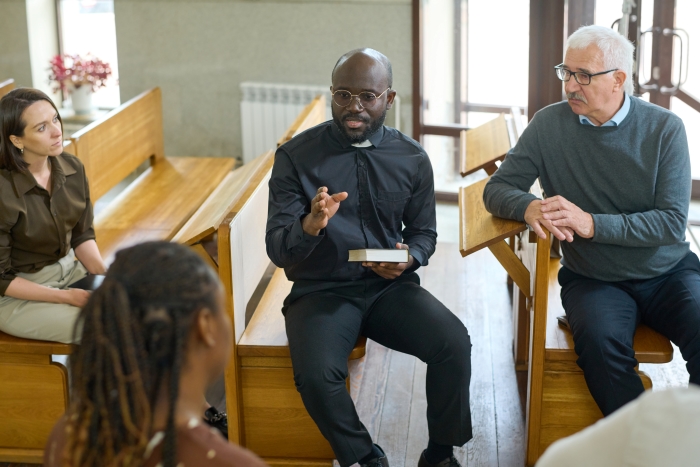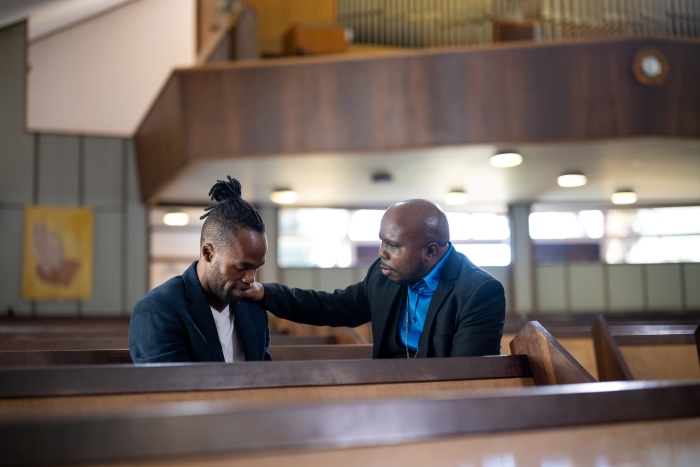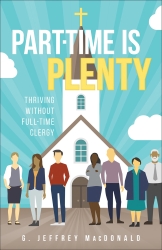In a typical UCC congregation, the pastor has at least three or four days a week when they’re not working for that church. That’s because 45 percent of United Church of Christ (UCC) congregations have part-time clergy, up from 35 percent in 2017.
But don’t assume all these part-timers are struggling to make ends meet or to lead balanced, fulfilling lives. The opposite is true. Part-time pastors are flourishing at levels well above their full-time peers. Part-timers score higher in 17 out of 17 categories measuring overall wellbeing and happiness, according to a fall 2023 national survey from the Hartford Institute for Religion Research.
Consider health. Only 62 percent of full-time clergy describe their overall health and wellness as good or great. Among part-timers, it’s a whopping 80 percent. Part-timers score significantly higher in physical, mental, relational, and spiritual health.
And the biggest margin where part-timers lead their full-time peers? Financial health. Ranked on a scale of 1 to 10, with 10 representing strongest feelings of financial and material security, the mean value for part-time clergy is 7.8. For full-time clergy, it’s 6.9.
With the part-time ministry trend showing no signs of slowing, it’s imperative that pastors understand why part-time is not the ticket to financial hardship that full-timers and newbies to part-time ministry often fear it will be.

Part-time is associated with good financial health and overall wellbeing because pastors are leveraging what part-time arrangements have to offer and reaping the benefits. When we look at how they do it, we learn strategies that can bear fruit in a variety of ministry contexts. These insights can position pastors to thrive, financially and otherwise, for as long as they feel called to be in ministry.
Though part-time positions vary in scope and context, they all offer the most valuable of resources: time.
Pastors in part-time roles are contracted to work anywhere from 10 to 32 hours a week for a local church. With the exception of Sunday morning duties, the hours tend to allow for a good bit of flexibility. When a pastor sits down to write a sermon, for instance, is up to the pastor. They spread their ministry hours over the 168-hour week, and when the work is finished, they’re left with 136 to 158 weekly hours that don’t belong to the church.
What they do with that nonchurch time – and with the time they give to their congregations – helps explain why part-timers are doing so well overall.
Fifty-six percent of part-time pastors don’t have a second job, according to data from the Hartford Institute for Religion Research, yet they’re thriving, nonetheless. This suggests many, if not all have other income streams, such as a spouse’s salary, Social Security, a pension, or income from investments. Given how well part-timers are doing overall, we can infer this bunch is using nonchurch time for other meaningful pursuits: friendships, family, exercise, volunteering, hobbies, and other contributors to quality of life. They’re not counting on church to provide for all their monetary, social, or spiritual needs. Thus when part-time ministry adds another layer of meaning and one more income stream to their well-rounded lives, the result seems to be fulfilling and sustainable.
“The most common second job, according to the most in-depth survey of mainline part-time pastors in North America, is self-employment….37 percent of those with two jobs are solo entrepreneurs.”
The remaining 44 percent of part-timers do have a second job (as do 24 percent of full-time clergy). This work is sometimes a second vocation, though it doesn’t have to be. It can be anything that fits with a pastor’s schedule: substitute teacher, freelance content creator, parish minister at a second church, and so on. The most common second job, according to the most in-depth survey of mainline part-time pastors in North America, is self-employment. That survey, conducted among 240 part-time United Church of Canada clergy in 2021, reports that 37 percent of those with two jobs are solo entrepreneurs.1 That’s more than double the percentage working any other type of second job. Pastors are finding that part-time ministry and entrepreneurship together make for a good fit and a good life.
It's not hard to see why. Pastors are entrepreneurial by nature: self-starting problem-solvers who are, in a sense, used to running their own shop at the church. Part-time ministry provides entrepreneurs – and really anyone who’s enterprising in their approach to work – with two big strategic advantages. They’re given a steady stipend and time. The stipend means that even when self-employed work is slow, several of the pastor’s monthly bills are still covered by a reliable paycheck. Beyond that, a part-time pastor’s flexible schedule makes time available for other paid work and business development, including during 9-to-5 hours. Leveraging these advantages helps a pastor take on business risks or go for the second job they find most compelling. What matters is that they’re enterprising and treating part-time ministry as a malleable asset for carving out a fulfilling, multifaceted, amply remunerative life.

Skeptics question whether truly part-time ministry is really possible. Some like to say, “There’s no such thing as part-time ministry, only part-time pay.” This perspective emphasizes that pastors have a 24/7 identity as clergy; that congregational life isn’t predictable; and that pastors are called to be responsive when needed. The implication, whether intended or not, is that a dedicated pastor wouldn’t be able to confine parish work to 10, 20, or 30 hours. Anyone who’s truly part-time isn’t dedicated, according to this logic.
Despite skepticism, truly part-time ministry is no misnomer – and no reason for shaming. If all ministry were in fact full-time, then we wouldn’t be seeing large, documented differences between the wellbeing of full-timers and that of part-timers. If part-timers were actually being paid less for the same work, then they’d be the ones on the low end of the health, happiness, financial stability, and wellbeing scales. Instead, they’re on the high end in every category.
Expectations have a lot to do with it.
What’s expected is distinct in healthy parishes with part-time clergy. These pastors are not trying to be prolific providers of religious goods and services, a motif in which a part-timer’s capacity would be quickly used up or deemed insufficient. Instead, they’re functioning more as field guides, helping practitioners perceive their worlds through Christ’s eyes and navigate an inherited spiritual tradition for themselves.
“The part-time pastor’s role is not to be the feeder-in-chief, but instead to empower others to feed themselves and their neighbors with God’s help.”
The part-time pastor’s role is not to be the feeder-in-chief, but instead to empower others to feed themselves and their neighbors with God’s help. The parishioner’s role is not to be a consumer of what the religious professional creates, but to develop one’s spiritual gifts and delight that they too are valued (not just the clergy’s). Rather than lament their pastor’s part-time status, laypeople practice rejoicing that their pastor trusts them to share leadership and is able to spend several days a week in lifegiving, nonchurch activities. Such habits of mind and heart might take time to gel, but they open the door to what part-time has to offer, including financial freedom.
Of course, if a pastor doesn’t maintain boundaries, part-time ministry can become unwieldy. Covenants can help by spelling out areas of responsibility – not only for the pastor, but also for the governing board and the congregation writ large. This codifies what shared ministry looks like in a particular setting. When the unexpected happens, it doesn’t necessarily fall to the pastor to address. This helps protect the pastor’s agreed-upon sphere and preserve their multiple days each week for nonchurch activities.
When the benefits of time are leveraged, lives in part-time ministry can be fulfilling and sustainable, even beyond traditional retirement age if a pastor wants to keep working. Designed to allow room for responding to all types of needs and callings, these ministries need not ever be a path to burnout.
Resilience in part-time ministry, however, depends on intentionality to keep expectations relevant and realistic. In this, conceptual frameworks can help. They equip a pastor and congregation with shared understandings of how roles are interpreted locally. This leads to fewer misunderstandings, disappointments and encroachments. It also helps congregations stay focused and moving forward.
Three proven ministry models provide framework options to guide part-time pastorates:
- In the Pastor as Equipper Model, laypeople get empowered to carry out ministries meaningful to them and valued by their congregations. The pastor dedicates a share of their church time for seasons of training. Laypeople systematically learn to share in particular ministries that the pastor used to do customarily, e.g., preach sermons, evangelize, lead study groups, visit the sick, or mobilize stewardship campaigns. As the flock becomes empowered, it grows less dependent on the pastor for execution and more mature in leading faith formation. In such shared ministries, engagement tends to climb while the pastor’s work remains truly part-time.
- The Pastor as Ambassador Model capitalizes on what’s possible in ministry settings where, as one pastor puts it, “the laypeople run the church.” If the pastor can leave worship to lay leaders once a month, for instance, that frees up 10 to 12 hours that can be used elsewhere. The ambassadorial pastor uses that time to represent the church in the community and build relationships. They might don a clergy collar or a t-shirt with the church’s name on it and go volunteer at a neighborhood cleanup, attend a Chamber of Commerce meeting, serve on a nonprofit board, write columns for local outlets, or help out at a youth sporting event. In other words, serve the common good while making the church and its pastor more visible, understood, and trusted in the community. Such things become possible, while staying within part-time hours, when laity anchor a ministry or two and an ambassadorial, entrepreneurial pastor goes out to bear authentic witness. This strategy keeps the church from turning inward with a part-time pastor. It systematically cultivates new relationships that can lead to church growth or foster other types of vitality.
- The Pastor as Collaborator Model recognizes that part-time pastors don’t have to duplicate what their colleagues are doing. At a cluster of three UCC churches in Massachusetts, pastors take a collective approach by dividing up the work. What’s created by one pastor is shared among all, whether that’s an adult study class, a youth activity, or liturgical copy for worship bulletins. In another take on this model, as it’s used in other states, a part-time pastor hands off specialized ministry tasks to other part-timers on their staff. Either way, collaborators empower colleagues to reach more people and save clergy from getting spread too thin.
Part-time ministers have been empowering Jesus’ followers and holding down secular jobs since the days when Apostle Peter and Apostle Paul were doing so themselves. Today, the model is giving lay people and pastors what they need to make ministry viable, healthy ,and joyful in the 21st century. As the church does so with God’s help, it’s one a step closer to fulfilling the New Testament vision.
“The gifts he gave were that some would be apostles, some prophets, some evangelists, some pastors and teachers, to equip the saints for the work of ministry, for building up the body of Christ.” (Ephesians 4:11-12, NRSV).
1 Bartlett, I. Ross. It’s Real Ministry: How Part-Time and Bi-vocational Clergy are Challenging and Empowering the Church. FriesenPress, 2022. p. 40.


